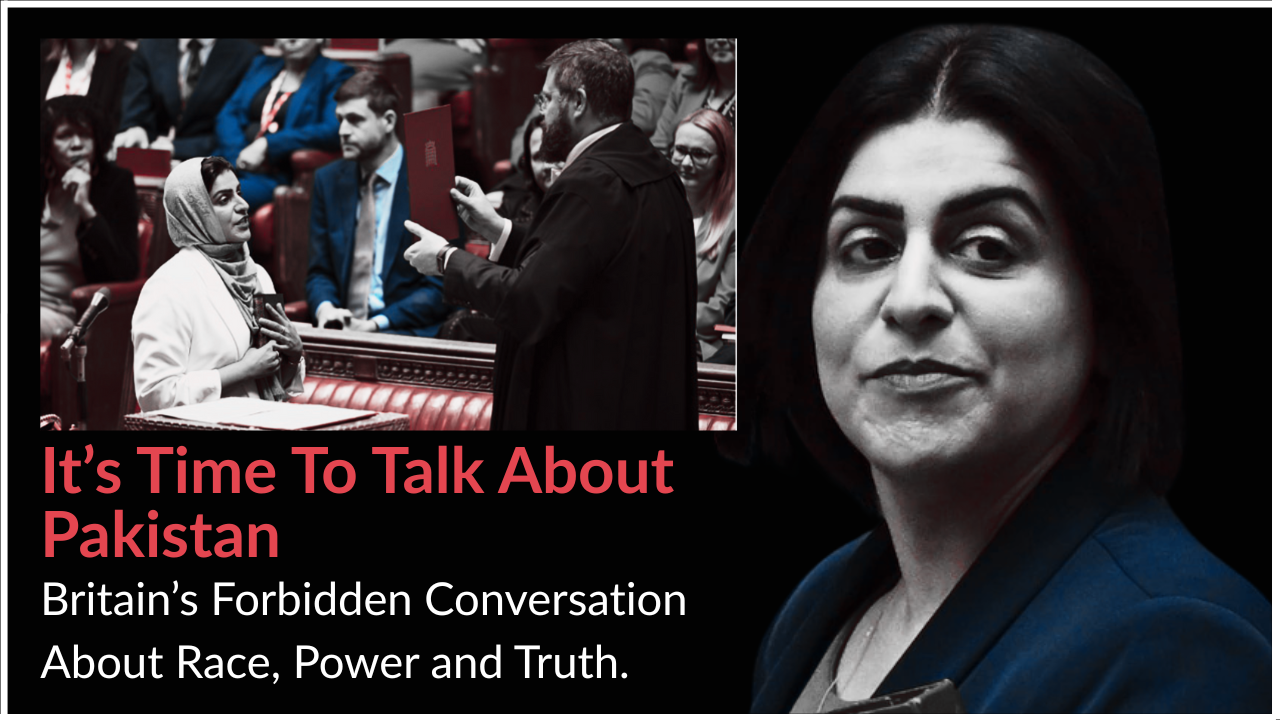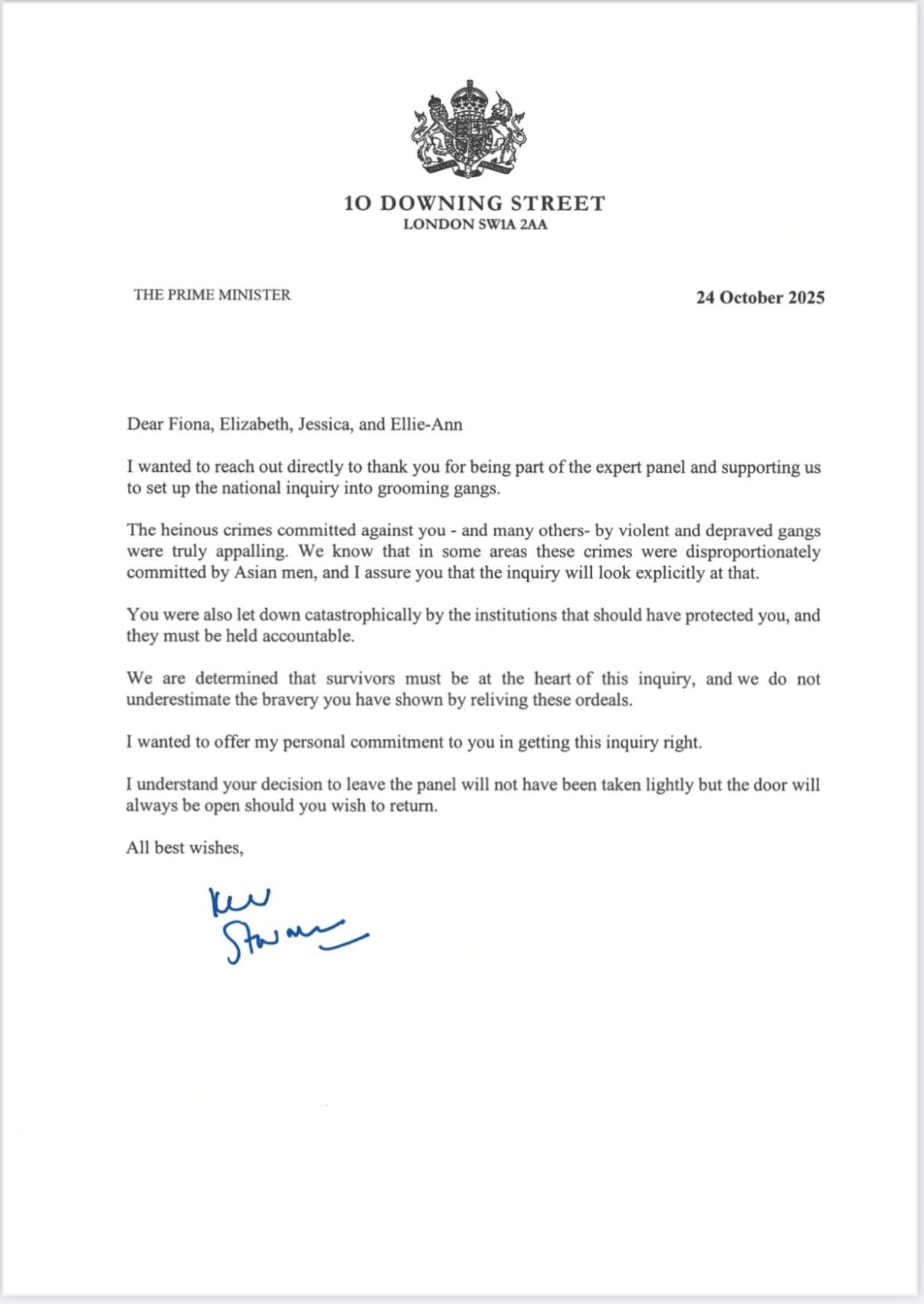It’s Time to Talk About Pakistan

Earlier this week, Prime Minister, Keir Starmer, wrote directly to survivors of grooming gang abuse, referring to their abusers as “Asian men.” Not Pakistani. Not Muslim. Asian.

Once again, Britain’s political class reached for the same tired euphemism used for more than a decade to blur the truth and shield those responsible. In their desperation to appear balanced, they have made millions of innocent East and South East Asians complicit in crimes that were overwhelmingly committed by men of Pakistani Muslim heritage.
This was not a careless mistake. It was a calculated act of moral evasion, the same instinct that allowed these crimes to flourish in the first place.
The refusal to name the perpetrators is not a new failure
It is part of a long tradition in Britain of avoiding hard conversations about the communities we imported and the ideologies they carried with them. Successive governments, terrified of upsetting a fragile multicultural consensus, chose denial over honesty. They buried the truth beneath polite language and bureaucratic vagueness, creating the conditions in which this poison could take root and grow unchecked.
The Pakistanis who arrived in Britain in large numbers during the 1950s and 1960s did not come as ideologically neutral migrants. They brought with them a worldview forged in the fires of rape, genocide, and ethnic cleansing that underpinned the brutal birth of the Islamic Republic of Pakistan.
For decades, that worldview was reinforced by state propaganda promoting the belief that Islam’s survival depended on separation, control, and purity. In Britain, this ideology went unchallenged. And so, here, it festered.
To understand the grooming gangs and the industrial scale sexual exploitation of this nation’s children, we must confront the deep rooted racial and religious prejudices embedded within these communities.
These men did not emerge from a vacuum
They were shaped by a culture that long ago learned to rationalise violence against those deemed inferior or impure.
Only then can we see that what is happening in Britain today is not a cultural aberration, but a continuation, a modern echo of what their fathers, grandfathers and great grandfathers once did in Pakistan.
The same doctrine that justified the slaughter and rape of Hindus, Sikhs and Bengalis during Partition found new expression in Britain. What had once been political became social. What was once a war between nations became a war for dominance within neighbourhoods.
The ideology that sanctified conquest and control now justified the exploitation of unbelievers, young, vulnerable, white girls who, in their worldview, were seen as morally corrupt and therefore available.
This was not simply criminal opportunism
It was behaviour rooted in cultural conditioning and sustained by collective acceptance. Within these communities, the subjugation of women, the authority of elders and the policing of behaviour were not extremes. They were norms.
This theology of social power, where men ruled women, elders ruled youth and sects ruled one another, created a world in which silence and submission were expected.
It was within that silence, and under the cover of communal respectability, that the grooming gangs were able to thrive. This is why a judge summing up the latest convictions in Rochdale raised concerns of how they all knew. And they all did nothing.
The grooming gangs themselves reflected this same social architecture. They operated along clan lines, often involving brothers, cousins, uncles, and family friends who protected one another through blood loyalty and communal silence. Authority was inherited, not earned, and obedience was demanded, not questioned. These were not isolated predators but organised networks bound by kinship, secrecy, and a shared contempt for the girls they targeted.
When this ideology metastasised into organised sexual exploitation, Britain’s institutions looked away. Police officers, councillors and social workers, many of them knowing full well what was happening, chose silence over truth. Fear of being called racist became more powerful than the duty to protect a child. The result was moral paralysis, an entire generation of girls sacrificed to maintain a comforting illusion of community cohesion.
Behind that silence stood another motive
Political survival. In many northern towns, Labour councillors relied on tightly controlled bloc votes from Pakistani communities to keep power. Those votes were delivered through local power-brokers, elders and mosque committees who demanded loyalty in return for turnout. The price of that loyalty was silence.
Politicians knew that confronting the grooming gangs meant confronting the same networks that delivered their majorities. So they looked the other way, protected their careers, and branded truth-tellers as racists and troublemakers.
The state, terrified of offending a vocal minority and addicted to the arithmetic of bloc politics, allowed the language of diversity to become the armour of depravity.
What began as political cowardice has since hardened into cultural orthodoxy
The same fear that once silenced whistleblowers now shapes our national conversation. Those who protected their bloc votes in the town halls now protect their reputations in Westminster, the media and academia. Instead of reckoning with what happened, they have rewritten the narrative, shifting blame, censoring debate, and recasting moral cowardice as tolerance.
This double standard runs deep. The same institutions that silenced victims and ignored predators now lecture the rest of us on morality.
In our schools, we teach children to carry inherited guilt for the sins of empire and slavery. We impose shame on a generation of mainly white working class children whose ancestors were themselves trapped in poverty and servitude.
Yet we dare not speak about the imported hatreds within Pakistani communities, nor confront the theology and tribalism that made these crimes possible.
The lesson is clear
In modern Britain, moral outrage is permitted only when it is politically convenient.
Today is the last day of Black History Month. For thirty-one days, Britain has spoken about oppression, injustice and the lessons of history. Yet the same nation that claims to confront racism still cannot speak the truth about who is raping its children.
Maybe next year, we will decide that all victims deserve to be remembered.
I think it's time we talked about Pakistan. Don't you?
My name is Raja Miah MBE. It’s been seven years since I began exposing how politicians protected the rape gangs. In that time;
- the police have tried and failed to prosecute me
- Politicians have tried and failed to silence me
- The mainstream media has smeared me, and when that failed to stop the truth from coming out, have now blacklisted me
- Pakistani gangsters and Islamists have openly called for my murder.
And yet; I’m still here. Still speaking. Still fighting for the truth.
Everything I publish is shared for free. There are no paywalls. No corporate sponsors. No hidden backers.
If my work has ever helped you make sense of a broken system, if it’s ever made you feel seen, heard, or hopeful, please don’t scroll past.
🔴 Support the work. The fight is far from over.
If you can afford to do so, just £3/month or £30/year. That’s 75p a week. Pennies to most, but everything to help keep this work alive.
Prefer a one-off contribution?
👉 http://BuyMeACoffee.com/recusantnine
👉 http://paypal.me/RecusantNine
– Raja 🙏